Asking the right questions
‘START with the end in mind’ is a helpful principle when seeking to define what it is that we are trying to achieve before setting off on a path of reactive, unintentional or ill-conceived decisions. Of course, this isn’t always possible. Sometimes we find ourselves having to react to things that are not in our control, or were not in our control to start with. However, having a plan and knowing the right questions to ask before we get going is a helpful starting point.
In this week’s issue, we introduce the Blueprint for Better Choices, which is a helpful toolkit of questions that has been designed to assist in decision-making around the key areas of The Salvation Army’s work in this territory. With so many good causes competing for our time and attention, it would be very easy for us to invest time and energy in things that may well have some merit – but are they what God wants us to be doing?
There are five key focus areas within the ‘Blueprint’ that can help us to discern what matters most. We will explore some of those in this issue.

MAJOR JULIAN WATCHORN Editor

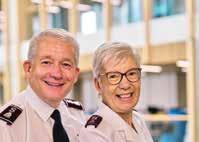
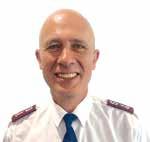


Territorial calendar Keep up to date with events Autumn listening Browse our podcast library
NEXT WEEK’S ISSUE
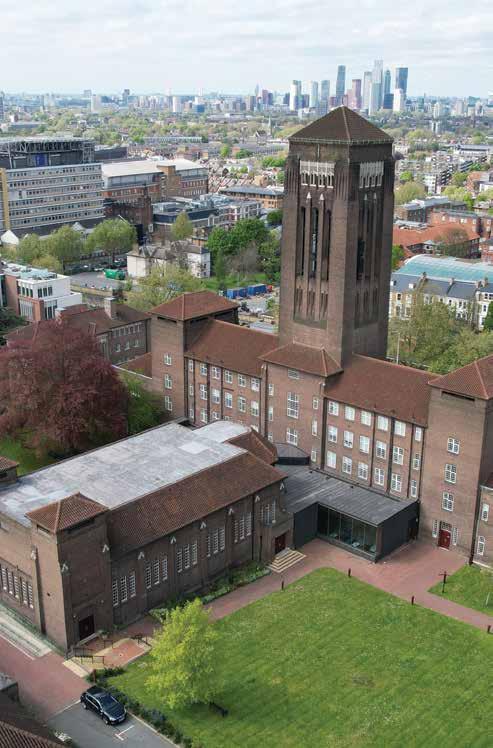
EDITOR Major Julian Watchorn
MANAGING EDITOR Ivan Radford
ASSISTANT EDITOR Stevie Hope
EDITORIAL ASSISTANTS Major Margaret Bovey, Major Lynne Shaw, George Tanton, Lyn Woods
SENIOR DESIGNER Hannah Holden
GRAPHIC DESIGNERS
Joseph Halliday, Louise Phillips
PROOFREADER Chris Horne
CONTACT US 020 7367 4890
salvationist@salvationarmy.org.uk
ADVERTISING advertising@salvationarmy.org.uk
DISTRIBUTION AND SUBSCRIPTIONS
Salvationist Publishing and Supplies (Periodicals), 66–78 Denington Road, Wellingborough NN8 2QH 01933 445445 / subscriptions@satcol.org
To subscribe, speak to your corps leader or visit sps-shop.com
SCRIPTURE QUOTATIONS
From the 2011 New International Version (Anglicised), unless otherwise stated
Issue No 2036 @SalvationistUKI @SalvationistUKI
FOUNDERS Catherine and William Booth
INTERNATIONAL LEADERS
General Lyndon Buckingham and Commissioner Bronwyn Buckingham
TERRITORIAL LEADERS
Commissioners Jenine and Paul Main
EDITOR-IN-CHIEF Major Julian Watchorn
TERRITORIAL HEADQUARTERS
1 Champion Park, London SE5 8FJ 0845 634 0101
© The Salvation Army United Kingdom and Ireland Territory. ISSN 2516-5909.
The Salvation Army is a Christian church and registered charity. The charity number in England, Wales and Northern Ireland is 214779, in Scotland is SC009359 and in the Republic of Ireland is CHY6399.
Published weekly by The Salvation Army and printed on paper from sustainable sources by CKN Print, Northampton.


Ignite!
As Bonfire Night arrives, Naomi Blowers calls us to spark faith into action
THERE is something captivating about fireworks. The sky darkens, the crowd goes quiet and, for a moment, anticipation fills the air. Then –BOOM! A brilliant burst of colour explodes across the night sky. Each sparkle fades quickly yet, for that instant, everything feels alive with wonder and light.
Fireworks have a way of capturing attention. They make people look up. They bring communities together. They transform an ordinary evening into something extraordinary. As Christians, we are called to do something quite similar: to shine brightly in a dark world so that others might look up and see God’s glory.
Jesus said in Matthew 5:16: ‘Let your light shine before others, that they may see your good deeds and glorify your Father in Heaven.’ That light isn’t meant to be hidden or quiet. It’s meant to shine in such a way that others can’t help but notice – not because of how impressive we are, but because of how radiant God’s love is through us.
Think of how fireworks start. Before the explosion, they’re simply shells – plain, unremarkable and waiting to be ignited. But, once they’re lit, the spark travels deep inside, reaching the powder that’s
been carefully packed within. The result is a dazzling display that transforms the night.
Our faith works in much the same way. Without the spark of the Holy Spirit, we’re just potential – shells with promise. But when God’s Spirit ignites our hearts, his power within us bursts forth in acts of love, compassion and grace. What was once ordinary becomes extraordinary.
Of course, fireworks don’t last for ever. They flare brightly, then fade into smoke. But our faith isn’t meant to fizzle out. The light we carry isn’t a fleeting display; it’s a steady flame that points to something eternal. Moments of brilliance matter, but what God calls us to is a lifetime of shining consistently, even when no one is watching.
Still, there’s beauty in the fleeting nature of fireworks. Each burst is unique – just like the way each of us reflects God’s glory differently. Some shine quietly through acts of service. Others blaze brightly in leadership or creativity. Some light the sky through words of encouragement while others illuminate dark places through simple kindness.
Sometimes, it’s in the darkest skies that the light shines brightest. Fireworks need the night to reveal their beauty.
Reflect and respond
Read Matthew 5:13–16. How can you shine before others this week in your words and actions? Pray for courage, confidence, compassion and grace.
Ask the Holy Spirit to keep your flame alight, even when no one is watching.
Likewise, God often uses our darkest seasons to reveal his greatest glory. When life feels heavy or uncertain, his light in us can still break through – bringing hope, comfort and awe to those around us.
So next time you watch fireworks, let them remind you of your calling. Let them draw your heart to the One who sets your soul alight. Ask God to keep your flame burning – not for your own applause, but so that others might look up and see his glory through your life.


(Oldbury)
‘I Have Nothing’ by David Phelps
It might seem criminal to say I prefer his version over Whitney Houston’s original, but it’s hard not to be overwhelmed by the emotions David Phelps shows.
‘End of the Beginning’ by David Phelps
It’s quite literally a description of the Bible from Jesus’ birth to his death. And I think it’s one of the greatest gospel pieces out there right now.
‘Holy Spirit Rain Down’ by Hillsong Worship
One night at worship, it was sung over the congregation and the music cut out. We continued to sing a cappella, and I could almost physically feel the Holy Spirit in the room.
‘Joy in the Morning’ by Tauren Wells and Elevation Worship
This song encapsulates everything about my faith that keeps me going. Everything happens for a reason, and you never have peace if you don’t let go of the things holding you down.
‘Thank You Jesus for the Blood’ by Charity Gayle
It’s a personal declaration of your faith and feelings for God. It’s actually the reason I developed a passion for worship music and for God.
• Based on an episode of Salvationist Radio’s Me and My Playlist. The podcast features young people from across the territory, as they share five tracks they love. Listen to more episodes at salvationist.org.uk/podcasts

‘I’m loved and accepted’
Specialist Support Worker Jason Rall (Gloucester House Lifehouse) reflects on how God became his cornerstone
IWAS in addiction for the good part of 20 years. I started my recovery in April 2015 and was detoxed in the August. That’s when my sobriety journey began and I was introduced to 12-step fellowships. They used the word ‘God’ and there was a concept of spirituality, so that was when my Christian journey started.
But, when I was 18 months into recovery, I became homeless and ended up living in Booth House Lifehouse in Swindon for 10 months. While I was there, I had conversations with the chaplain, Captain Brian Ward. We would thrash it out and I started looking at the Bible. That’s when my faith journey started to take off and I ended up becoming an adherent.
I’m still in 12-step recovery today. Faith is a big part of that because 12-step recovery uses the concept of a higher power. Gloucester House Lifehouse is a 12-step rehabilitation centre, so a higher power – a God of your own understanding – is part of what we do here.
I have conversations with people on an almost daily basis regarding spirituality. I think a lot of people beat themselves up about their past, but I believe I’m wonderfully made and created in his image. I don’t depend on other people for my self-confidence. It’s nice to be appreciated by people, you know, but my relationship with God comes first, then everything else follows. For me, faith is a daily thing. The way I look at it, God is like a life support machine: he’s the one lead that does not need to be unplugged. Faith is my cornerstone. I’m up every morning at 6am and I have things in place, like reading the Bible and prayer meditation. I also meet with people for a Bible study every other Monday.
The funny thing is, if you’d have
spoken to me about God 11 years ago, I would not have been interested! But I ended up in a place where there was nothing more you could take from me. I’d lost another relationship. I hadn’t seen my children in five years. I was unemployed. Homeless. It was all gone.
Then it was as if God spoke to me. The loving hand of God reached out to me and said: ‘It’s gonna be all right!’ There were no angels coming down or some guy with a big beard, but it was like he asked me: ‘Are you done yet? Because I’ve been waiting for you. I’ve got some work for you to do.’
The beautiful thing about God is that I’m loved, I’m accepted, I’m forgiven, and I’m never alone. That’s the simplicity of my faith. So I would say to anyone, ‘Give God a go, you’ve got nothing to lose!’
Have you got a testimony to share? We’d love to hear your faith story! Get in touch at salvationist@salvationarmy.org.uk
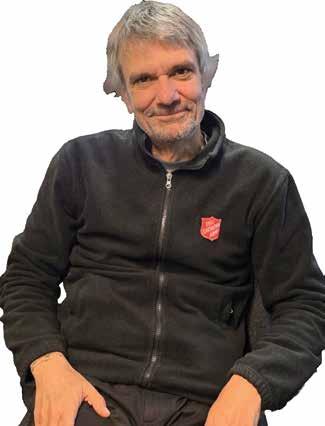
Leicester West Radiating the gospel

Embracing everyone
I’ve been the corps leader since March 2023. My wife, Jo, recently joined me in leadership of the corps as a territorial envoy.
We’re a multicultural fellowship of mostly young families, with an attendance of up to 70 people on Sundays. Jo takes our Sunday school of about 20 young people eager to learn about faith. We’ve seen a lot of growth since the Covid-19 pandemic.
Everyone is easy-going and we embrace contemporary and traditional worship styles. We have a small brass band and a pianist. Occasionally, we hold a contemporary music workshop led by Major Ian Loxley. The following Sundays, the youth lead worship with guitarists, singers and a pianist.
We also have a corps charity shop that brings in a few hundred pounds each week and helps us to keep mission going.
QWest Youth Church
There’s a large youth contingent at the corps and we’re outgrowing our building and prayerfully hoping to extend the hall. We recently held a youth Alpha course, which transitioned into a youth church that meets every Friday evening. About 15 people, aged between 11 and 22 attend, and recent topics have included identity and anxiety.
We called it QWest as a play on Leicester West. We do a meal, games
with a scriptural message and fellowship, often with discussion questions. It’s a format the young people like.
We took six of our young people to the East Midlands and Wales divisional summer camp this year and Jo and I were both there as staff. A lot of the youngsters were new to camp, and it was the first time they’d encountered people from other corps – the Salvation Army world broke out of the four walls of Leicester West!
Alive and growing
We’ve been making many new members, which is a real privilege. At one point, we ran three consecutive sessions of recruits’ classes. The church is its people, and God is blessing us by adding new people to our family.
One of our soldiers, Tim, entered William Booth College this year as a member of the Proclaimers of Transformation session. He wanted to do a final trip home to Zimbabwe before heading to college, so I journeyed with him. I was involved in lots of Salvation Army events there – I even spoke a few words at a congress. I’ve been learning some Shona, and we incorporate Zimbabwean praise in our meeting at Leicester West every few weeks.
Our corps is like the early Church in Acts – a community of people that share everything and enjoy being together. If I wasn’t an officer, I would soldier here
because of the loving atmosphere that’s cultivated. This community of believers radiates the gospel!
The gospel is alive here, and it’s our mission to make it relatable and relevant, bringing it to everybody in our community in an easily understood way. In everything, we ask the question: What would Jesus do? He would love and come alongside people in all contexts and situations. That’s what we strive for.
Fast facts
DIVISION East Midlands CORPS LEADERS Captain Liam Beattie and Territorial Envoy Jo Beattie
FIND US ONLINE facebook. com/100091308745315

Living hope
Lieutenant Martyn Bellshaw encourages us to make a good connection with God
STRAIGHT in. No messing about.
I associate these phrases with a no-nonsense approach. There is no hesitation. Of course, there is a time and a place for a thoughtful, measured, slow start to things, but our study passage is straight in at verse 3: ‘Praise be’!
I often find I hesitate when faced with difficulties, not sure what to do, where to go or how to respond. Does that sound familiar? It sometimes feels a little hopeless.
If we look closely, though, there is a direction given in our passage that gives us a different way to do things when faced with difficult options. A no-messing, straight-in option! We need to praise.
Sounds simple, doesn’t it? Yet it is often last on our list of things to do when we respond to situations where we feel hopeless.
PAUSE AND REFLECT
What is your natural response to difficult situations?
Do you hesitate or have you managed to achieve the automatic response of turning to praise?
We do need to read on to make sure we get the praise right. Our praise, our worship, our whole lives need to be focused on God. Our hope through praise is only because of ‘his great mercy’ (v3), through all that Jesus has done for us.
In verses 5 to 9, the promises about our inheritance in Christ are just amazing! I read these verses and am filled with a jumping-up-and-down feeling, a hairs-on-the-back-of-theneck-standing-up kind of ‘inexpressible and glorious joy’ (v8). Yet it is so much more than this. Its depth is beyond my understanding. The situations I face are still difficult, yet, because of this living hope, I rest in the assurance of who I am and whose I am.
PAUSE AND REFLECT
Reflect on verses 5 to 9.
Pull out some of the promises that we have through our living hope.
When we live this way, what changes? It’s worth noting that nowhere in this passage does the writer tell us that life is going to be easy when we put our hope in Christ. In fact, verse 6 highlights that people might ‘suffer grief in all kinds of trials’. For some there is no ‘might’ about it!
Yet, in these experiences, the living hope is that our circumstances ‘result in praise, glory and honour when Jesus Christ is revealed’ (v7). The last part of that sentence is important: ‘when Jesus Christ is revealed’. Sometimes it is difficult to see Jesus in our everyday, ordinary lives, never mind our suffering. However, in my experience of ministry and life, I have seen time and time again the power of people choosing to find Jesus in those moments.
Choosing – yes, it is a choice. That word is pivotal in how we move from hopelessness to hope. It’s not easy, but Jesus didn’t promise easy. However, he did promise his presence, and that is what allows us to live in the assurance of who we are and whose we are.
PAUSE AND REFLECT
What do you, or could you, do to help you to choose to see Jesus in the ordinary everyday?
In reading verses 10 to 12 of our study passage, I was at first confused. Initially, I couldn’t work out why the author was worrying about what was prophesied when we already know that it happened. Then, I remembered this letter wasn’t written to me. When those who first heard the letter read in their gatherings, they would have heard these verses and been reminded that all of this wonderful mercy and hope in Christ had been part of the plan all along. What is it the prophets spoke of? Grace (see v10).
When I hear the word ‘grace’, I often associate it with other words: amazing, undeserved, freely given, a gift, and many more. As I journey through my walk with the Lord, the more I learn, the more I realise there’s much I don’t know. One thing I do know is that my dependence on the depth of his grace becomes so much more important.
When I trained to be a Salvation Army officer, the name of my session was the Messengers of Grace, and we were charged to be just that. In order for each


of us to be communicators of God’s grace, we need to know it for ourselves. It needs to be the pattern of our whole lives. If we live by grace in our thinking, in our being and in doing, I believe that we will discover what it is to embrace a life that reveals our living hope: Jesus. It all sounds so simple, but how do we practically achieve this? An old Sunday school chorus that my granny taught me comes to mind: ‘Read your Bible,/ Pray every day,/ And you’ll grow, grow, grow.’ I fear that I often try to complicate this whole thing with trying to keep up with the latest trends or apps – some of which can be useful – and fail to remember that it is all about connecting with God. The best ways to do that are to study the living word of God and intentionally spend time in prayer. It is then, and only then, that we will fully experience the living hope that is ours through his mercy and grace.
PAUSE AND REFLECT
How much time do you spend connecting with God?
What needs to change to allow you to discover living hope in Christ?



A shortened version of Prayer Matters will continue to be published weekly in Salvationist in 2025. To read the full, unedited booklet, visit salvationist.org.uk/discipleship
SATURDAY 1 NOVEMBER: CARE FOR CREATION – COP30
Lord, as national leaders gather, draw their attention to the dual cry of the poor and of the Earth. Instil courage and compassion, provoking them to stand bravely, with practical political passion, for the good of the whole of creation and for the sake of others. by Major Heather Poxon (Territorial Environmental Officer)
SUNDAY 2 NOVEMBER: SABBATH PRAYER – PRAYING FOR PEACE
O Lord, I am reminded that my prayers start with a desire to live in peace with my family, community, country and beyond. Thank you for blessing me with the gift of Jesus, the Prince of Peace. Help me to keep my eyes on Jesus as I strive to live in peace. I long to reflect the nature of Christ. by Major Jill Miller
MONDAY 3 NOVEMBER: SHARING THE GOOD NEWS – NEW ARCHBISHOP OF CANTERBURY
We give thanks for the Bishop of London, the Right Rev Sarah Mullally. We pray for her in this season of transition, that she will hold a posture of peace and trust, and that she will sense the guiding of the Holy Spirit. by Lyndall Bywater (UKI Boiler Room Team)
TUESDAY 4 NOVEMBER: SERVING AND CARING – NORTH WEST AND ISLE OF MAN DIVISION
Pray for the division as they welcome, nurture and disciple young people. Give thanks for every young person connected to corps and centres in the division, and for every person who supports youth and children’s work. Pray that, through activities and relationships, the love of God will be evident and irresistible. by Major Steve Fripp (Divisional Mission Officer) and Lyndall Bywater (UKI Boiler Room Team)
WEDNESDAY 5 NOVEMBER: GROWING IN FAITH – BONFIRE NIGHT
We remember in prayer those for whom the sound of fireworks is traumatic, such as those who have escaped war zones or been caught in explosions. We pray for peace and good company in these challenging days. We also pray for churches hosting Bonfire Night events, that the warmth of the welcome will be equal to the warmth of the fire. by Lyndall Bywater (UKI Boiler Room Team)
THURSDAY 6 NOVEMBER: INTERNATIONAL SALVATION ARMY – LATIN AMERICA NORTH TERRITORY
The territory covers Colombia, Costa Rica, Cuba, the Dominican Republic, El Salvador, Guatemala, Honduras, Nicaragua, Panama and Venezuela. It serves vulnerable communities, providing essential resources such as drug rehabilitation centres, schools and community corps, addressing needs often left unmet by government agencies. We pray blessing on them, and on the territorial leadership team of Colonels Leonardo and Evangelina Fernandez and Lieut-Colonels Juan Mercado and Lydia Mercado Berberena. by Lyndall Bywater (UKI Boiler Room Team)
FRIDAY 7 NOVEMBER: JUSTICE AND RECONCILIATION – UNITY IN THE CHURCH
The English tradition of Bonfire Night was born of religious persecution, from a time when different groups of Christians felt the need to purify the Church by eradicating those who disagreed with them. God, forgive your Church when we have committed violence in your name, and strengthen us to work for reconciliation and unity, so that religious intolerance will be eradicated.
by Lyndall Bywater (UKI Boiler
Room Team)
LIEUTENANT MARTYN BELLSHAW Corps Leader Gillingham
PRAYER REQUESTS
Do you have something or someone you’d like us to pray for?
Email salvationist@salvationarmy.org.uk with ‘prayer request’ in the subject line.

Moving forward with confidence
Commissioners Jenine and Paul Main introduce the Blueprint for Better Choices to help us step into the future with faith, courage and spiritual discernment
AS the world changes around us, we recognise the need to make thoughtful choices – ones that keep our Army strong, effective and true to our calling, now and into the future.
That’s where the Blueprint for Better Choices comes in. Think of it as the plans a builder uses, helping us create a solid foundation for all that we do. This ‘Blueprint’ is the result of months of prayer, discussion and collaboration across every level of The Salvation Army.
“ We want more time seeking holy discernment in every proposal. ”
We want everyone to be up to date with this shared vision. This is not a new strategy and rest assured we’re still committed to our territory’s five mission priorities: sharing the good news; serving others without discrimination; nurturing disciples of Jesus Christ; caring for creation; and seeking justice and reconciliation. The ‘Blueprint’ helps us to focus on what matters most and ensure that all our decisions – big and small – support our mission priorities and values. We have been drawing inspiration from the Old Testament story of Joshua. Joshua moved forward with courage, careful planning, and faithfulness – and, like him, we step into the future knowing God is with us.
Just as Joshua prepared the next generation, this ‘Blueprint’ helps us to do the same – it sets out the most important areas to guide our actions and empowers each of us to serve with confidence and hope. There are five key areas we want us all to focus on in these present days:
5 key areas
Courageous Discipleship
Whatever programme, project or strategy you are considering, we want you to ask: Does this encourage growth in faith and enable people to live out a commitment to following Jesus, even when it takes real courage? Are our activities deepening spiritual lives and helping us support one another?
Most Marginalised, Most Excluded
This is part of our DNA as an Army and remains a key focus area. In all that we do, are we reaching out to those who are often overlooked or left out, making sure that everyone feels valued and has a place among us? Do our actions reflect a deep commitment to inclusion and compassion?
Prophetic Voice
Is what we are doing or proposing speaking into our world with honesty and hope? Are we addressing injustice and advocating for positive change? Do we reflect Jesus’ values by standing up for what’s right in our communities?
Children and Youth
You will have heard us speak about the importance of generational legacy. Is what we are doing providing opportunities for children and young people to grow, lead and flourish in faith? Do we listen to their voices and create space for their gifts and energy?
Guiding questions
For every proposal or programme, ask:
What does fullness of life for all with Jesus look like for people in this?
Why is now the right time for this?
How will we know when it is time to stop?
Growing Leaders
Are we creating pathways for new leaders at every level, to emerge and thrive, so that our mission can be sustained into the future?
We readily admit that these key areas may change over time, but they are what we see as priorities for our Salvation Army now. The ‘Blueprint’ also offers a number of questions we need to ask ourselves in whatever setting we are in, whether that is in THQ or DHQ boards or in a local setting, as we consider how we will spend our resources, be they financial, people or time.
When any of us are reviewing our current programmes or considering a new programme or project, we are asking you to look at it through the lens of the ‘Blueprint’ and think through these guiding questions. We hope this will help us all consider fully our motives and impact, and encourage thoughtful stewardship of our resources.
Beyond that, we ask you to think deeply: What is The Salvation Army’s unique role here? How will our efforts make a meaningful impact, and how will that impact be measured? We want much more time spent inviting God into our decision-making, seeking holy discernment in every proposal. And let’s not forget the practical side – if resources change, how does that shape our approach? Are we prepared to adapt while keeping our mission at the forefront?
The ‘Blueprint’ isn’t just for leaders at headquarters. It’s for everyone – every soldier, every member, every supporter of the Army. By reflecting on these five focus areas and these guiding questions, each of us can play our part in building a strong, lasting Salvation Army.
We invite each of you to pray, to participate, and to look for your place in this mission. Together, by keeping this ‘Blueprint’ at the forefront of our thinking, we can move forward with confidence – trusting God to guide us every step of the way.
Thank you for your commitment and for joining us on this journey. Let’s step boldly into the future, with faith, courage and a heart to serve!
• Access the Blueprint for Better Choices at salvationist.org.uk/blueprint

Going deeper with God
Secretary
for Spiritual Life Development
Major Gordon Cotterill talks about courageous discipleship and his new role
Can you describe your role?
I’m officially responsible for spiritual life development in the UKI Territory, but I wouldn’t say that’s strictly true. We’re each responsible for our own spiritual life development. My role is to ensure that it’s at the forefront of everyone’s thinking. I can help create the right conditions where people do take responsibility and have that desire, and recognise that desire is God and comes from God.
How would you sum up spiritual life development?
Spiritual formation, discipleship, is important for us all. It forms us, renews us and transforms us to be more like Christ. It’s about creating the right conditions for growth. We can’t make the seeds grow, but we can create the right conditions. It’s easy to go through your day-to-day and not stop and listen, to lose the ‘with God’ element. Spiritual discipline takes work –grace is opposed to earning, but not effort. We’re responsible for that effort, so that when we’re hit with the desire to go deeper with God, it’s not head knowledge but heart knowledge. That desire keeps us reaching for what we don’t understand.
How has your own understanding of spiritual formation grown?
My wife and I were commissioned in 1998. We went into ministry as corps officers at Poplar. I cut my teeth in mission there, not as a task to do, but by being God-sent people in a community. We went back to college, initially as practitioner tutors, then as spiritual programme directors, and I started to teach spiritual formation, which made sense of why I did mission and how it sustained that. I found a good companion in Renovaré, which exposed me to voices such as Richard Foster, Dallas Willard, Henri Nouwen and Evelyn Underhill,
and to ideas such as the ‘with God’ life, when we experience community with God, and our place within who God is. We recognise the importance of grace. We understand that the Kingdom is available here and now, and that shapes who we are. That started to shape me. I developed a curriculum for cadets based on the book Renovation of the Heart
In recent years, we’ve been at Sutton Corps and have seen mission and spiritual formation connect. As I arrive in this role, I know that if we don’t have spiritual formation as well as mission, we burn out and forget who we are. It’s essential that the values of who we are are seen in the virtues we live out, individually and as a Movement.
What do you do day-to-day?
I’m leading spiritual formation groups with divisional leaders and thinking about how we get that to trickle down. I’m enjoying journeying with our territorial leaders in terms of what spiritual formation within the organisation looks like. I’ve been asked to set up a theological think tank, to ask what God is saying to us from a practical theological perspective. I’m journeying with Major Gary Lacey and Lyndall Bywater from the UKI Boiler Room and territorial prayer network, which is gathering momentum. In the year ahead, I’m leading several retreats. I’m also working with William Booth College to see how their Retreat space can
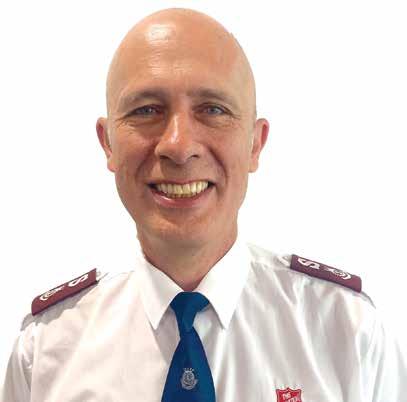
I’m excited about cultivating energised by faith and seek Because new to say to us all the time. I sit on Cabinet and it’s great to see their process of discernment:

we stop and ask what we’re hearing from God. It’s good part of that.
How does your role tie in with the Blueprint for Better Choices?
The ‘Blueprint’ isn’t a document: it’s a deep listening tool to change culture. It’s a directional tool, so we stay authentic to our calling. Deeper listening will result in deeper living, which is in line with the holiness tradition of who we are as a Movement.
Courageous discipleship is at the heart of the ‘Blueprint’. It’s number one in the five key areas – the other four flow from who we are. If we’re not energised by faith, we become merely a charity. And we’re more than a charity: that’s what God has called us to be. That’s not to denigrate who we are as a charity or how people respond to us as a charity, but we are who we are because of who we are with God. I think part of my role is to ensure we hold on to that.
Richard Rohr talks about John 1 and how ‘in the beginning was the Blueprint’ – the Word with a capital ‘W’. The essence of God was made flesh through Jesus. Later in the Bible, we come to the Word being in us, and us being in union with Christ. Ultimately, the essence of God has to be seen through us. There’s a temptation with any organisation, not least the Church, to focus on the form of who we are – but we need to start with the essence of who we are. If we get that order right, I think we’ll be OK.
How does Covenant Sunday play a part in our spiritual rhythm?
We want Covenant Sunday to be about creating a year-round culture. We all make a covenant when we say that we want to follow Jesus, be more like Jesus and have the Word of God dwell in us. It’s about ongoing discipleship. The fruit of the Spirit is the evidence of that. When the goodness of God, the glory of God that was veiled for Moses in Exodus 33 – ‘I will ... cover you with my hand until I have passed by’ (v22) – is revealed and reflected in us, that’s astonishing! That covenant is for everyone – and it’s not limited to one day of the year.
• Covenant Sunday will be on 11 January 2026, themed Break Ground, Bring Hope. For more, visit salvationist.org.uk/ resources/covenantsunday2026
Speaking truth and hope
Major Kerry and Lieut-Colonel
Nick Coke (THQ) call us to be a prophetic voice in the public square
BILLIE Holiday’s ‘Strange Fruit’, a song about the lynching of black Americans, is widely regarded as the greatest protest song of all time. Why? First, it spoke truth. Second, it was embodied by the messenger’s own experiences. Third, it provoked a reaction. Fourth, it came with consequences.
Speaking truth, embodying the message, provoking a reaction, living with the consequences – these are the hallmarks of the prophetic voice. It is a strange fruit, indeed.
Billie was not the first to sing a powerful, prophetic song. Perhaps that was Mary, who, upon becoming pregnant with Jesus, burst into the Magnificat (see Luke 1:46–55). Considering the time and context, Mary’s song is revolutionary and subversive. It speaks of a world turned upside down, where the humble are lifted up. It speaks truth, it is embodied by the one who sings it, it demands a reaction, and it comes with consequences, not least Mary’s son being crucified.
The Old Testament prophets, too, spoke God’s truth in song and poetry, energising God’s people to a new way of living and being. They included the uneducated Amos, raging against people’s hypocrisy, the compassionate Jeremiah, whose prophecies became deep laments, the courageous Nathan, who told King David his misdeeds had brought judgement on the kingdom, the apocalyptic Ezekiel, whose imagination cast visions we still marvel at, and Jonah, who tried to run from his calling.
The prophetic voice has many tones – anger, lament, courage, imagination, discomfort, disruption and hope. And it comes from different kinds of people – men, women, young, old, the learned, the uneducated, the marginalised and the underestimated.
In the New Testament, the prophetic voice takes on a different shape with the coming of the Holy Spirit. Prophecy becomes available to the many – a gift given to the Church.
In the Gospels, we witness Jesus as a prophet. He displays anger (see Matthew 21:12 and 13), he despairs at the state of God’s people (see Luke 21:28) and speaks of the last days to come (see Mark 13). Many at the time believed the Messiah
What does prophetic voice mean?
‘To echo in public and private the just and righteous intentions of God for the whole of creation. It is marked by a call to personal and social holiness, and to strive for a world marked by justice and right relationships.’ (Blueprint for Better Choices)
was going to liberate them and Jesus did: his revolution was through spiritual empowerment, which had social and ethical implications.
Jesus’ Sermon on the Mount lays out the way Christians are called to act. Love your enemies. Give to people in need. Don’t judge others before yourself. Forgive others. Reject violence. These are all prophetic acts of standing your ground against oppressive powers.
So what does all this mean for us today?
We live in a world where ideas of truth have become complex and contested. Political and public culture is driven by emotional narratives, argument and division, often to the detriment of factual accuracy. The prophetic voice is about recognising God’s greater vision of a life where people are drawn together, not set apart.
Where should we use our prophetic voice to speak truth? Today’s public square is everywhere – our homes, streets, schools, town halls, corps, workplaces and digital spaces. Authentic faith transforms everything about us – our words, our actions, our attitudes – and cannot be hidden. We must therefore embody our message in our hearts and in the values we live out every day. A prophetic message is more than words. Whenever we live and speak prophetically, we will provoke a reaction. This is perhaps the most challenging element for us as an organisation. How prophetic can we be while protecting goodwill towards us? We also have our own internal public square that needs to hear the prophetic voice. We cannot expect to point the finger at others without examining ourselves.
The Old Testament prophets often end their messages with a vision of hope: a world made new, bathed in God’s light and love, with Jesus at the centre. This world is coming. Let us imagine and articulate this real hope.
We can do this by keeping calm, remaining compassionate, staying humble and being faithful, by pointing to God’s expansive love, going deep into life with Jesus and being relentlessly hopeful. It requires all of us being dedicated to Jesus and one another. Being a Movement that goes to the hard places and seeks to live the Jesus way. Being a people willing to love the one who disagrees.
This is our prophetic voice in the world.
If it’s your will…
Major Lynne Shaw reflects on what Godly bravery looks like
IN 1896, Henry Heinz spotted a shoe company advertising that they had 21 styles of shoes. That inspired him to create the iconic marketing slogan ‘57 varieties’, even though Heinz made more products than that at the time –allegedly, five and seven were his and his wife’s favourite numbers. In 1959, the company opened a Heinz Beanz factory in Kitt Green, Wigan, now the largest food processing plant in Europe. Jump forward to today and Heinz produces more than 5,700 products, because Heinz means more than Beanz!
What would have happened, though, if Heinz stopped at 60? I mean, that’s enough beans for anyone to be going on with. What if Heinz didn’t take risks? What if it didn’t innovate or go against the prevailing practices of the time?
There are lots of things we are tempted to say when a different course of action is suggested to us. ‘That’s not the way we do it here!’ ‘We tried it once!’ ‘We’re not ready for that!’ ‘It wouldn’t work for us!’ These things aren’t always the wrong thing to say but, when they belie an attitude of control or always needing to be right, they become steps to stagnation.
Whenever I think about following God’s leading, I end up at two different stories: the one where God leads the Israelites by a pillar of cloud by day and a pillar of fire by night, always in front of the people (see Exodus 13:20–22), and
the one where Ruth pledges to follow Naomi, saying, ‘Where you go, I will go, and where you stay I will stay’ (see Ruth 1:16).
The common theme in both is releasing control. People choose to bend their will to God’s, to relinquish their need to direct things. This allows them to untangle themselves from their egos, and consider things from other perspectives, especially God’s.
Holding on is sometimes believed to be what makes us strong, but letting go may require more strength. This kind of bravery means being open-minded, willing to be uncomfortable while things change, and trying to stretch for new things. It can also mean being brave enough to stop something, even when it might seem to be working.
The principles behind this bravery include one that’s been highlighted in Prayer Matters recently: understanding the times we live in. We need to see where we are placed, what’s needed around us, and what people and resources we’ve got.
Another thing we need to appreciate is that many of us have been taught to fear quitting and failure. We’re hardwired never to give up on something, even when God is the One leading us to give it up. Perhaps we worry about what other people will think or how particular people will react.
Letting go of something for God
doesn’t make you a quitter; it empowers you to move forward, to go where God is going, to keep God in front of you. It means you know your time and energy are being spent well.
We can all create environments where stopping things, trying things, pausing to listen, and even appearing to fail are embraced by love, grace and obedience to God’s leading.
You might be familiar with Joshua 1:5 and 6, where God tells Joshua: ‘As I was with Moses, so I will be with you; I will never leave you nor forsake you.’ These words encourage us to have courage and faith. You might also be familiar with Paul’s words to a young Timothy, as he teaches him to advance God’s work of love, by faith: ‘Don’t let anyone look down on you because you are young, but set an example…’ (1 Timothy 4:12).
It’s a helpful picture of being brave in following God, despite what others might think.
Are you being led by God? Then be brave! Trust God to guide you in making Godly decisions, that God is out in front of you, leading you in love and light.

MAJOR LYNNE SHAW Editorial Assistant Publishing Department
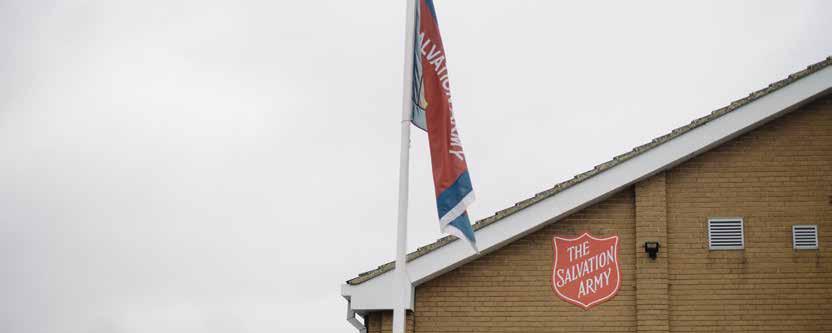
What is a corps?
Captain John Clifton reflects on a heckle that led to a deeper question
AN older guy in red called out from the back of the hall. It was the middle of my sermon, my first word as divisional commander. The hall was packed. The mood felt celebratory. I’d barely introduced myself, and now someone was standing, interrupting. I had a sermon to finish, a room full of Salvationists, and this guy in a red shirt – anathema to a Tottenham fan – was taking the floor! What could go wrong?
He called out: ‘Our corps has just been closed and I challenge you to reopen it.’
Boom. There it was. A challenge. I felt like I’d been tripped mid-race, arms flailing, in front of a crowd – would I fall or regain my composure?
Slightly flustered, I replied: ‘Bro...’
I don’t think I actually said that out loud. I did call him ‘brother’, for some reason. The moment called for fluent Christianese. Meanwhile, in the corner of my eye, I could see my actual brother, sitting in the corner with a gentle smirk, munching on his metaphorical popcorn while the entertainment turned up a notch. I replied to the man – maybe not this smoothly – but it’s what stuck with me:
‘I’m not going to come and reopen your corps for you. I’m flipping that responsibility back to you. That’s your job. Organise people, build it up and we’ll be there to help. Your corps is not your building or your budget, although they’re both helpful. It’s your people. And if you haven’t got any, then you need to do something about it.’
Inside, I was still flustered, but I carried on, addressing everyone: ‘It’s not fun to close corps. And we’re getting too good at it. If you don’t want your corps to close, then grow it. Gather people. Every Army has seasons of retreat. But let’s do it strategically, not simply because we’re out of options. And let’s regather to match those retreats with new attacks.’
Reflecting back, the heckle was a cry for purpose. He wanted his corps back. But opening a corps is not about the building. It’s about the people – and what animates them. Blood and fire, not bricks and finance.
So what is a Salvation Army corps, really? The word ‘corps’ comes from the Latin corpus, meaning body. It’s used to describe a subdivision of an army, like the Royal Army Medical Corps. That etymology matters. Because a corps is a body. It’s alive. It’s a subdivision of an Army and a local expression of the global Church. More than that, it’s the collective embodiment of the body of Christ in a particular place, participating in the mission of God.
That mission is articulated in The Salvation Army Act 1980: ‘The advancement of the Christian religion as professed, believed and taught by the Army and, pursuant thereto, the advancement of education, the relief of poverty, and other charitable objects beneficial to society or the community of mankind as a whole.’
A corps is a community of people who put these purposes into action. Action is a word often associated with the Army. It’s seen in our emphasis on Bible passages such as Matthew 25:31–46. We understand that Jesus is present in situations where people suffer conditions of powerlessness. We also see that the faithful Christian response is to be with people and build Christian community. This might range from helping people experiencing homelessness to setting up a knitting group. It’s faith made visible.
A corps is a worshipping, serving, covenantal body of people that exists to glorify God and bring the gospel to the world. Our language can obscure this reality. We might say ‘I’m going to the corps’, meaning the building. But the
corps is the people and it’s at its most powerful when every person is operating at their fullest, God-given capacity.
A corps is made up of many kinds of people. Adherents belong to, and participate in, the worshipping life of the corps. Officers, where present, are commissioned soldiers who lead from within the body and carry pastoral and organisational oversight. Staff add contracted capacity, helping to extend the mission. Volunteers contribute time and energy, often embodying the compassion and creativity of a corps. Clients may come seeking help, but are invited into belonging and transformation. Donors and customers resource the mission – and, when their giving is relational, they too become part of the story.
But first and foremost, a corps must have soldiers – covenanted people who take responsibility for its doctrine and mission. Without covenantal responsibility, it’s a project or a provisional gathering, untethered from the faith as professed, believed and taught by The Salvation Army.
‘You shall raise up the foundations of many generations; you shall be called the repairer of the breach, the restorer of streets to live in’ (Isaiah 58:12 New Revised Standard Version). That’s what a corps is for.
Whether you’re wearing epaulettes or calling out from the back of the hall, be part of something holy: the body of Christ.
• Based on a blog post originally published at salvationisminthemargins. substack.com

CAPTAIN JOHN CLIFTON Divisional Commander North East Division
Growing leaders
Territorial Candidates Directors Majors Catherine and Jonny Smith introduce themselves and the prayer initiative 9:38
How are you finding your new roles?
Jonny It’s such a privilege to see what God’s doing in people’s lives. Majors Mark and Andrea Sawyer, the outgoing territorial candidates directors, have been brilliant. Because of who they are and the work they’ve done, they’ve tilled the ground.
Catherine Every day is different and it’s inspiring listening to people’s stories. A lot of this role is about hope. It’s about seeing people listen to God and work out how that works in the everyday now, because calling isn’t just about the future. I was called to be an officer at 12 – how can we help people make sense of calling at any age? I feel like we’ve been trusted with a lot, but we also expect a lot from God. In this beautiful yet complex world, Jesus has hope for it. He continues to show love and determination for people to come into fullness of life with him. I want to see that.
What excites you right now?
Jonny It’s clear that God is not done with The Salvation Army. There are lots of people exploring officership, territorial envoyship and other areas of ministry, which is exciting. Also, God’s not just speaking to people in their thirties or forties. God’s speaking to young people. At the European Youth Event in August, people were invited to stand if they felt a calling and 100 people went to the stage!
Catherine We’re joining in with what God’s doing, which always provides momentum. I pray that people are excited about seeking God’s heart and will. In today’s world, we need to be all the more discerning.
Calling is so tied to discernment and discipleship, isn’t it?
Jonny It’s all about what you’re called to. When people say ‘I want to be an officer or territorial envoy’, you want to hear where God’s voice is. I’m really passionate about whole-life discipleship. If we get discipleship right, everything else follows. Jesus calls each of us: come, follow me. Catherine There are great initiatives in different divisions to help build that culture, such as Growing Leaders and Transformers, as well as Design for Life Children.
What’s on the cards for the coming year?
Jonny We’re launching Design for Life Youth, aimed at 11 to 18-year-olds. We’re working with Children and Youth and will be running a trial in January.
Catherine We’ll learn from that pilot and then hopefully it’ll be a package that divisions can use themselves, like Design for Life Children.
How did the most recent Design for Life go?
Jonny Design for Life is such a simple concept, but it’s a beautiful, deep weekend. Major Jean Bradbury started it 30 years ago and it’s still going because it works. Catherine People come expecting to meet God and, of course, they do. The most recent weekend ranged from a 22-year-old to a 76-year-old. It was such a wide mix of people all exploring calling! Our heart is to see an increasingly diverse range of people responding to God’s call.
What would you say to someone who feels a calling?
Jonny People often say ‘I was called years ago, but I didn’t do anything’. They would have been used by God where they are, but I would encourage everyone to ask, ‘What is God calling me to?’ If a calling to spiritual leadership is on your heart, talk to your corps leader or email salvationarmy.org.uk
Catherine If your calling is to officership, there is now the possibility of different training options, taking into account previous experience and circumstances.
Tell us about 9:38. What can people be praying for?
Jonny At officers’ and territorial envoys’ councils this week,
we launched 9:38. It’s a call to prayer, inspired by Matthew 9:38: ‘Ask the Lord of the harvest ... to send out workers into his harvest field.’ We want everyone to pray to the Lord to send out workers at 9.38am each day. Pray for those called to be spiritual leaders. Pray for those nearing or in retirement as they discern where they are called to serve. Pray for those living out Jesus in their workplaces. Pray for families called to be like Jesus in school, college and their communities.
Catherine It’s inspired by Divisional Leaders Majors Mandy and Steve White, who have embedded this in the London Division, after being inspired by someone else! Today they have a list of people in the process of applying for officership and territorial envoyship, and their prayer list is growing daily!
Jonny It doesn’t have to be complicated: just stop for a minute at 9.38 and pray!
• For more on calling and vocation, visit salvationist.org.uk/calling
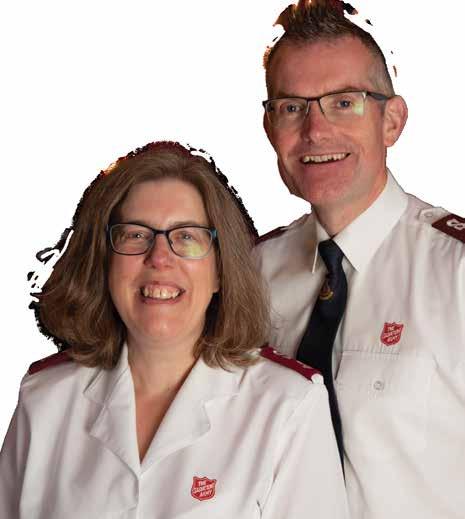
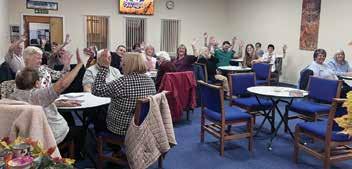
FAULDHOUSE A joyous evening was had by all at the Harvest supper and quiz night, with great food, great fellowship and a great time of thanksgiving. Celebrations continued on Sunday with Harvest praise and the altar service. Food collected was donated to a local food bank. – RR

SOUTHAMPTON SHOLING The corps celebrated Harvest with displays created by Retired Bandmaster Brian Jones and his team. The celebrations included a supper and quiz. Sunday worship encouraged everyone to recognise God’s goodness and beauty in creation and each other. – MS

CIRENCESTER The Harvest altar service was followed by an informal singalong and buffet tea, with people thanking God for his provision. – MG
INTERNATIONAL
IHQ General Lyndon Buckingham is recovering well following a medical incident last month. He was admitted to hospital where he received excellent treatment, in the form of heart angioplasty to clear a blocked artery. The General and World President of Women’s Ministries Commissioner Bronwyn Buckingham are grateful for the many expressions of prayerful support from around the Salvation Army world. Chief of the Staff Commissioner Edward Hill commented: ‘I’m pleased to report that the General is recovering well.’ The General said in a statement: ‘I have responded to this procedure well and am expected to make a full recovery. We feel wrapped in the love of the global Salvation Army and give thanks to God for his providential care.’ – AR
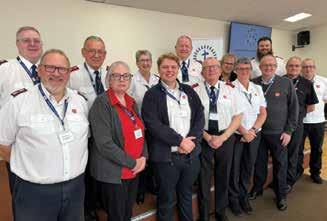
ECUMENICAL
Journeying together
HAYES CONFERENCE CENTRE
FOURTEEN Salvationists from Wales, Scotland and England represented the Army at the annual All-Ecumenical Representatives Conference.
Delegates met to worship, discuss, pray and share fellowship under this year’s theme of Ecumenism: Journeying Together. Time was taken to celebrate the different forms of worship of other churches, learning what these mean and learning to value our own forms that we perhaps take for granted.
The concept of pilgrimage was explored through modern and classical art.
The Rev Peter Colwell, deputy general secretary of Churches Together in Britain and Ireland, led a session on how Christians can journey with those of other faiths, in dialogue and practice.
Churches Together in England’s Living with Diversity Working Group on Human Sexuality led a session on how the Church builds relationships and supports those often ignored and forgotten.
Practical examples of pilgrimage were expressed and the conference concluded with a presentation on the journey of Churches Together in England’s Racial Justice Working Group and its connection to the local church. – AR

AND YOUTH
NORWICH CITADEL East of England Youth led a Sunday meeting themed You Are Enough. The East of England Youth Band and Youth Chorus provided music and Divisional Youth Specialist Nathan Bright made the point that God equips those he calls. After the meeting, the visiting groups joined the band for Church on the Street in the city centre. – MW
ALL the World has relaunched as a digital magazine, telling the global story of The Salvation Army.
What began in 1884 has stepped into the digital age, with a new format and platform, and a mission to make soul-stirring stories, theological reflections and thought-provoking viewpoints from every corner of the globe more accessible than ever before.
Articles will be published on Mondays, Wednesdays and Fridays.
Secretary for Communications Major Peter McGuigan quoted Revelation 1:19 as an inspiration and a vision for The Salvation Army’s international communications.
He said: ‘We want to inspire readers by writing about the history of The Salvation Army – “what you have seen” – about the mission happening now all over the world – “what is now” – and about the future – “what will take place later”.’ – AR • Visit All the World at salvationarmy.org/all-the-world


ENVIRONMENT
WOOD GREEN Lesley Harris used her amazing creativity and artistic skills to create a display based on the Army’s care for creation mission priority. The fascinating display highlights the beauty of God’s creation while challenging people to look after it better. It has been a real showstopper and has challenged many who use our building through the week. – JB
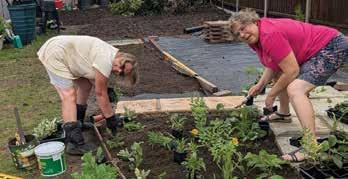
COMMUNITY
DISS A new community garden is turning unused space into a peaceful sanctuary, where local residents can grow fruit and veg, learn new skills and connect with neighbours. Support has already been strong. Potatoes have been planted and are sprouting in preparation for a Christmas harvest, and a fundraiser is inviting people to donate £2 to help create accessible pathways. Corps leader Major Paula Mark said: ‘This is about more than just gardening. It’s about creating a place where people can come to pause, breathe and enjoy nature together.’ – AR
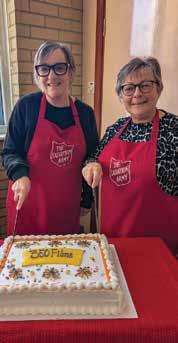
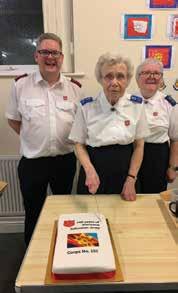
ANNIVERSARY
SUNDERLAND MILLFIELD
The red carpet was rolled out for a viewing of Ice Cold in Alex, marking the 350th movie showing for the weekly Silver Screen Film Club. Established for older members of the community, the club helps reduce social isolation and is supported by the city council’s East Area Committee Community Chest. Corps leader Captain Caron Doyle explained: ‘Older people can be bypassed, but this is a place where they can come and meet other people and enjoy themselves.’ Volunteers Sandra and Lesley are pictured cutting a cake. – AR
WALLSEND Corps leader Captain Chris Still compèred a musical programme that saw the band and songsters joined by Newbiggin-bythe-Sea Corps. Highlights of the evening included the songsters performing ‘In the Army’ and ‘I’ve Been Changed’, and the band concluding the evening with the lively ‘Fired Up!’. On Sunday, anniversary celebrations continued with worship led by Community Mission Facilitator Ivan Storey (Newbiggin-by-theSea). – CS
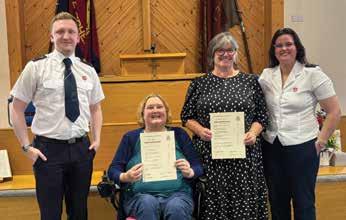
PAULA and Elizabeth were welcomed as adherents by Cadets Megan and Simon Moore. Paula testified to the warm welcome of the church and how she felt at home coming through the doors. Elizabeth testified to the transformational power of Jesus and the peace that this gave her. – SM
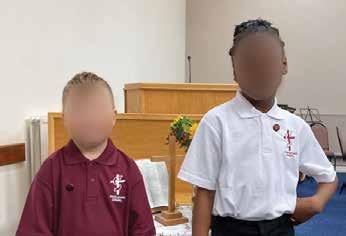
OLIVER and Kiitan were enrolled as junior soldiers by corps leader Captain Huw Dutfield. Oliver has attended the corps all his life with his parents and his brothers. Kiitan recently started attending with her mother and sister. – FT
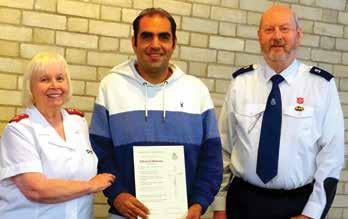
MOSTAFA was welcomed as an adherent by corps leader
Major Lorraine Kreuiter. Having converted to Christianity, Mostafa had to leave his country and eventually moved to Burnley. He has worshipped at the corps for the past 18 months and is a well-loved member of the corps family and an inspiration to us all. Also pictured is Corps Sergeant-Major Johan Kreuiter. – LK
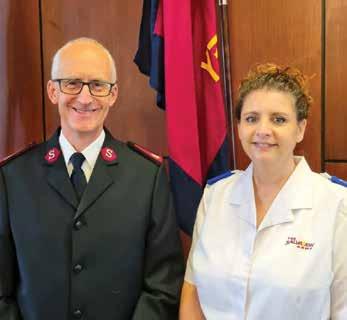
GUERNSEY
TRACEY De La Haye was enrolled as a soldier by corps leader
Major Andrew Diaper-Clausen. Tracey was brought up from childhood as an active member of The Salvation Army in Guernsey. This year, she began attending regularly, playing an active part in the life of the corps. Tracey believes recommitting to being a soldier is part of God’s plan for her life. – AD-C
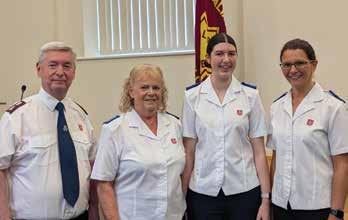
AMELIA French was enrolled as a soldier by corps leader
Major Ian Davis. Amelia was born into The Salvation Army and previously lived in Portsmouth. She came to Stockton with her family almost four years ago and is our newest and youngest soldier. The corps welcomes her and cannot wait to see the great work she will do. Amelia is pictured with Major Ian, mentor Judith Wigham and prayer partner Nicola Tapster. – TB
WHAT DOES BEING A SOLDIER OR ADHERENT MEAN?
Find out more about formalising your membership of The Salvation Army and ways in which you can make a spiritual commitment at salvationist.org.uk/membership

ARMY PEOPLE
International appointments
The following appointments and promotions, decided upon by the General, have been announced by the Chief of the Staff
Effective 1 March 2026
LIEUT-COLONELS IAN AND ELISABETH
GAINSFORD, officers of the New Zealand, Fiji, Tonga and Samoa Territory, as Directors, International Social Justice Commission-Designates, to become Directors, International Social Justice Commission, effective 1 April 2026
Appointments
Effective 1 November 2025
MAJOR JULIE JOHNSON, officer in retirement, THQ Chaplain (2 days per week)
LIEUT-COLONEL DAVID SHAKESPEARE, officer in retirement, Personnel Officer for Administration, Personnel Service (3 days per week)
Ef fective 1 January 2026
MAJOR IAIN HUDSON, Head of Integrated Mission, Homelessness Services
MAJOR ADRIAN LEE, Foster and Tuncurry, New South Wales, Australia Territory
MAJOR CHRISTINE LEE, Foster and Tuncurry, New South Wales, Australia Territory
Effective 1 March 2026
MAJOR ALISON HUDSON, Director of Wellbeing Department Designate, THQ
Effective 1 June 2026
MAJOR ALISON HUDSON, Director of Wellbeing Department, THQ
Local officers appointed
CORPS SERGEANT-MAJOR JAN ZIDANI, Risca
Promoted to Glory
WELCOME SERGEANT CHERRY NELLIST, Bourne, on 12 October
MA JOR ALMA BROWN from Grace Manor Care Centre, Gillingham, on 14 October
Bereaved
MAJOR RAY BROWN and Corps
Secretary Dawn Paulowski, Chatham, of their mother
Major Alma Brown
ENGAGEMENTS
Territorial Leaders Commissioners Jenine and Paul Main Sun 9 Nov The Cenotaph, Whitehall (Remembrance Sunday)
Chief Secretary Colonel Peter Forrest and Territorial Secretary for Leader Development Colonel Julie Forrest Tue 4 Nov Lambeth Palace (Churches Together in England Presidents’ Dinner)* Sun 9 Nov The Cenotaph, Whitehall (Remembrance Sunday)
*Colonel Peter Forrest only
NOTICES
Care for creation Bible study
An international, hour-long Bible study is led by different people on the first Tuesday of each month, alternating between 8am and 8pm. The next will take place on 4 November at 8pm, led by Head of Mission Resources Carl Jobson (THQ) on the theme Our Shared Liability. For more information, email environment@ salvationarmy.org.uk
Remembrance Sunday
Resources are available to support your Remembrance Sunday service, including a new sermon starter that acknowledges pain, loss and Christ’s call for peace. There are also poppy-themed PowerPoint templates, video renditions of the Last Post and more. Visit salvationist.org.uk/resources/remembrance-sunday
Be a Star
Get ready for your Christmas fundraising and community outreach with the Be a Star resources. They include editable donation cards and collection tin wrap, ideas and materials for planning community meals, and Christmas Present Appeal resources. Download them at salvationist.org.uk/resources/christmas
Poetry Corner
Salvationist is bringing back Poetry Corner throughout the year to explore each of the territory’s five mission priorities: share the good news, care for creation, nurture disciples of Jesus, serve others without discrimination, and seek justice and reconciliation. If you have a poem about or inspired by serving others without discrimination, please send it to salvationist@salvationarmy.org.uk for consideration by 7 November.
SOUNDS
Sunday Worship
Join Salvationists across the territory in worship, with music, prayer and a Bible message from a guest speaker. This week’s message is from Captain John Clifton (North East DHQ). Can’t join us at 11am on Sundays? Catch up with the weekly podcast of highlights. Each week’s broadcast is repeated in full on Sundays at 6pm, Mondays at 12am and Thursdays at 9am.
• Listen online at salvationist.org.uk/radio
Sing to the Lord with the ISS
Enjoy favourite recordings from the International Staff Songsters, chosen this month by Penny Babb (Regent Hall). Listen at 5pm on Sunday 2 November.
• Listen online at salvationist.org.uk/radio
Morning Praise with Kids Alive!
Get your day started with half an hour of music, prayer, a thought and lots of giggles! Listen on Saturdays from 7.30am to 8am. Can’t tune in on Saturday morning? The broadcast is repeated in full on Sundays at 9am and Mondays at 7.30am.
• Listen online at salvationist.org.uk/radio
CROYDON CITADEL, BOOTH ROAD CR0 1XY INTERNATIONAL STAFF
SONGSTERS
An evening of music with The Salvation Army’s premier choir
Saturday 15 November, 7pm
The ISS in concert
Tickets £10-£12 (concessions apply)
To book tickets visit ticketsource.co.uk/salvationarmycroydoncitadel or call 020 8680 9924
Sunday 16 November
All welcome!

10am Worship meeting, 12pm Town centre worship, 2.30pm Festival of praise
Saturday 15 and Sunday 16 November
Hadleigh Temple welcomes the
BIRMINGHAM CITADEL BAND
Saturday concert at 7pm
Tickets £12 (bank transfer, cheque or cash only), under-16s free entry
Tickets from Wayne Johnson Email wjohnson15@hotmail.co.uk Tel 07801 107365
Sunday worship and praise at 10.30am and 2pm
TO LET
ALTEA, SPAIN Modern two-bedroom, two-bathroom heated apartment. Pool, tennis, garden, garage. Shops, restaurants, beach close, hill-walking. Warm winter area. Airport transfers available. Tel 02920 759314 or email jonesda19@outlook.com.
TOPSHAM, DEVON Two-bedroom cottage overlooking Exe Estuary and hills. Local shops, inns, teashops, walks. Coast, moors, Exeter nearby. Tel 02920 759314 or email jonesda19@outlook.com.
NOTTINGHAM WILLIAM BOOTH MEMORIAL HALLS NG1 1EU
THE INTERNATIONAL STAFF BAND
Saturday 29 November, 7pm
Tickets: £15 balcony | £12 downstairs
Available from ewan.domleo@salvationarmy.org.uk
CASTLEFORD, BOOTH STREET WF10 1SA
MAJOR KEN LAWSON’S 100TH BIRTHDAY CELEBRATION CONCERT
Friday 14 November, 7pm
Featuring Castleford Salvation Army Band, the Yorkshire Fellowship Band and guest soloist Hannah Wainwright
Everyone welcome
For further information see Castleford Salvation Army Facebook page: facebook.com/castlefordsa


SANCTIFY YOURSELVES, FOR TOMORROW THE LORD WILL DO WONDERS
